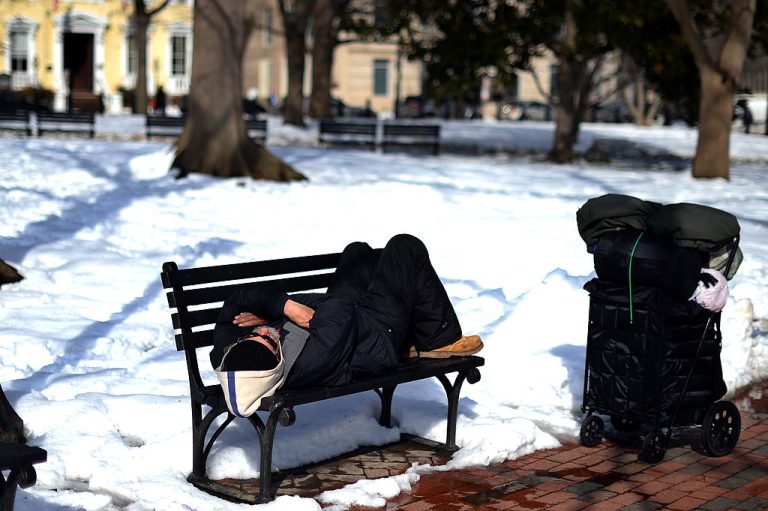A third of all residents in one Toronto-area homeless shelter are students who are unable to afford rent in the city’s massively inflated housing bubble, a staff member told the media.
The shocking figure was made public during an Aug. 25 Bloomberg article carried in Canada’s Financial Post by Mark Aston, an employee at Covenant House Toronto, a local homeless shelter.
Aston told the outlet that a third of his facility’s clients are area students, recounting the story of a Toronto Metropolitan University mechanical engineering student who, in 2019, walked through his doors after she was forced to leave home because of family issues, but had no way to afford rent.
MORE ON CANADA
- Chinese National Claiming $40,000 Annual Income Buys $32 Million in Vancouver Real Estate
- British Columbia Opioid Deaths Outpace COVID Fatalities Amid China-linked Drug Epidemic
- BMW, Mercedes Export Scheme to China Plagues Canadian Dealers
Aston said the anecdote left him “astounded for a whole number of reasons.”
“One, that somebody could actually have that much turmoil going on in their life, that much instability, and yet continue to perform and stay in a really high-demand course,” he explained.
Success
You are now signed up for our newsletter
Success
Check your email to complete sign up
The staffer told Bloomberg that the crisis has gone on for years, with roughly 26 percent of all facility residents being local students in 2019.
Today, Aston estimates that number has grown to one third.
Some perspective
A terse examination of housing availability for the Toronto area on RentCafe shows at the time of writing that there are only 245 one bedroom rentals available in the entire city.
Toronto is home to nearly 3 million people.
The lowest price listed is a small 450 sq. ft apartment for $1,399 per month.
The ad boasts that the suite, which appears to be antiquated, comes with two appliances and resides in a building with a shared laundry room.
The next best listing on the site is of a similar apartment that appears to have been recently uplifted for $1,447 per month.
Both figures are exclusive of the cost of utilities and Internet.
To put the employment market available to students into perspective, a current job listing for a barista at Toronto-area Starbucks locations states it pays $16 per hour.
Ontario’s minimum wage is $15.50 per hour.
A quick Google search for the average number of hours for a part time Starbucks position brings up a question and answer thread for the coffee chain at employment website Indeed, where some respondents say their average week consisted of approximately 20 hours.
A 20 hour part time minimum wage work week would generate approximately $1,280 per month, before tax deductions.
Although this level of income is so small that it falls into Canada’s tax-free bracket, deductions will still be taken, with the refund only being delivered during tax season.
By comparison, for a part-time worker who works 30 hours per week, they would generate approximately $1,920 per month.
This figure would result in a combined annual tax, employment insurance, and Canada Pension Plan contribution bill of more than $200 per month, according to the Intuit Canada Income Tax Calculator.
‘Historic correction’
To put the housing crisis of metropolises such as Vancouver and Toronto into easy-to-understand terms, Bloomberg cited data from the Toronto Regional Real Estate Board, which showed that the average price to rent a one bedroom in Toronto is a bewildering $2,269, up from $1,800 in Q1 2021.
On top of the high costs, the vacancy rates are astonishingly low, at only 1.6 percent.
The Board attributes the inflation to the increased cost of mortgages as the Bank of Canada raised interest rates to 2.5 percent from 0.25 percent thus far this year, in addition to demand acceleration stemming from the elimination of Coronavirus Disease 2019 (COVID-19) measures and hysteria.
In July, Royal Bank of Canada Chief Economist Robert Hogue warned clients in an analysis piece that the country’s housing market was set for a “historic correction” after the BoC delivered a heavy 100 basis points hike in July.
Hogue calculated that the overall market would see a 23 percent crash in housing prices before the end of 2022, followed by an additional 15 percent in 2023.
In July 22 reporting, Vision Times calculated the real world impact of increased rates on mortgages, finding that, based on data at the time:
According to mortgage sales website rates.ca, a 5-year fixed rate mortgage via RBC was an average rate of 2.99 percent in 2020 when the BoC’s rate was only 0.25 percent.
Using RBC’s online mortgage calculator, a $500,000 25-year mortgage at the 2020 rate would have resulted in the following contract:
Monthly payment: $2,363
Interest cost over term: $69,110.62
Total interest: $209,097.76
Rates.ca states that the best rate available through RBC today, however, is 5.89 percent. The difference in burden is exceptional:
Monthly payment: $3,166.42
Interest cost over term: $138,467.25
Total interest: $449,921.62
Bloomberg explained that for domestic undergrad students, university housing is likewise so expensive that it prices many out of the market, costing between $13,000 and $22,000 annually.
A confirmed trend
A second Toronto-area shelter that caters specifically to teenagers, Horizons for Youth, confirmed the trend with Bloomberg.
Manager Sara Jaggernauth told the outlet that pre-pandemic, the average stay was only three months. In today’s world, that figure has doubled to six months, and demand keeps rising.
The case of an anonymous University of Toronto “second-year computer science student” who stayed at the shelter “after his university dormitory access ran out at the end of first year” was recounted in the article.
“He tried looking for a basement apartment, or a roommate who could share costs, but couldn’t find anything affordable. As he prepares to begin classes again next month he says he’s anxious about the workload and worried about how he’ll manage the commute from the shelter, which can take up to an hour,” the article states.
A spokesperson for the shelter told the outlet that the student was the valedictorian at his high school.

















